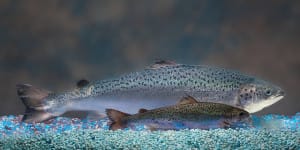The Washington Post
by Brady Dennis

Genetically engineered salmon won’t be hitting U.S. dinner tables anytime soon. Two months after federal regulators approved the nation’s first genetically engineered salmon for human consumption, the Food and Drug Administration on Friday issued a ban on the import and sale of the fish until the agency can publish guidelines for how it should be labeled.
The FDA’s action was prompted by language in a sprawling federal spending bill passed by Congress recently, which instructed regulators to forbid the sale of genetically engineered salmon until the agency finalizes rules about how it should be labeled — a process that potentially could take years.
In November, after a prolonged regulatory battle, the FDA approved the AquAdvantage salmon, produced by Massachusetts-based AquaBounty. The Atlantic salmon contains a growth hormone from a Chinook salmon and a gene from the ocean pout — a combination to help it grow large enough for consumption in 18 months instead of the typical three years. The agency initially said it could require additional labeling of genetically engineered foods only if “there is a material difference — such as a different nutritional profile” between the altered food and its natural counterpart. In the case of the AquaAdvantage salmon, FDA found no such differences.
But Sen. Lisa Murkowski (R-Alaska) pushed for language in an omnibus spending bill on Capitol Hill, directing the FDA to prevent the AquaBounty salmon from reaching the U.S. market until regulators finalized labeling guidelines. Friday’s import alert was a response to that directive, an FDA spokeswoman said, adding that the agency “intends to fully comply with the language” in the bill.
“This is a huge step in our fight against ‘Frankenfish,’ ” Murkowski said in a statement Friday, using the derisive nickname critics use to refer to the genetically altered fish. “I firmly believe that mandatory labeling guidelines must be put in place as soon as possible so consumers know what it is they are purchasing. It seems that the FDA has begun to listen, and I hope this is a sign that the agency plans to develop these necessary guidelines.”
The effort marks a victory — though perhaps a temporary one — for activists and commercial fishermen who have raised concerns about whether the AqauaBounty fish is safe to eat and whether potential environmental harms could result if any of the modified salmon made their way into ocean waters and mated with wild salmon. The Massachusetts-based company repeatedly has argued that its fish, which are all female, sterile and currently raised only in land-locked facilities in Canada and Panama, actually could reduce pressure on wild stocks and prevent the over-fishing of Atlantic salmon. The FDA has said its approval was “based on sound science and a comprehensive review” and that regulators are confident the genetically altered fish is safe to eat.
AquaBounty’s chief executive, Ronald Stotish, said in a statement Friday that the FDA’s import alert “has no impact on AquaBounty’s operations as we are not currently importing our salmon into the United States.”
Brady Dennis is a national reporter for The Washington Post, focusing on food and drug issues.
The post FDA Bans Imports of Genetically Engineered Salmon — For Now appeared first on Cornucopia Institute.